

Let the Games Begin! Recycling Metals for Olympic Medals
|
Every four years, the world comes together to spectate the world’s biggest sporting event: the Summer Olympic and Paralympic Games! The Games had its genesis in sports competitions that the ancient Greeks held in Olympia, Greece but the modern iteration as a global sports event held every four years that many of us are familiar with only began in 1896. Only 14 nations participated in 1896, but the Olympic Games Tokyo 2020 are expected to see top athletes from over 200 nations participating!
The best souvenir an athlete can bring home from the Games is of course, an Olympic medal. The design of these highly-coveted medals are under the purview of each hosting country, which makes them even more exclusive. However, the medals of the upcoming Olympic Games Tokyo will be particularly special, as they will all be made of recycled metals! It is not the first time the Games have given out such medals – an estimated 30% of the silver and bronze medals awarded at the Rio de Janeiro 2016 Olympic Games were actually made of recycled metals, but this will be the first iteration of the Games at which all medals will be made of recycled materials. The citizens of Japan have also been actively involved in the process, thanks to the efforts of the Tokyo 2020 Medal Project. Since the launch of the project in April 2017, donations and support have poured in from citizens all across the country. Many events were held to promote participation in the project, some even featuring national athletes to drum up more interest. Japanese people could easily donate small household appliances and devices that they no longer needed (such as handheld phones and smartphones, digital cameras, game consoles, and laptops) at conveniently-located donation boxes, or at participating telecommunications vendors. The project has also spawned many conversations about recycling in general, and has raised public awareness about the importance of reducing waste and being environmentally friendly. By the time the project concluded in March 2019, approximately 78,985 tonnes of used small electronic devices were collected across 1,621 participating municipalities all over Japan. From these devices, contractors were able to extract approximately 32kg of gold, 3,500kg of silver, and 2,200kg of bronze! This amount of metal is what is required to manufacture the medals, which means that every single medal awarded at the Games – whether they be gold, silver, or bronze – will be made from recycled materials! Sports fans may also feel a sense of affinity with the athletes knowing that their donation, no matter how small, has contributed to the medals that the winners will wear proudly around their neck! |
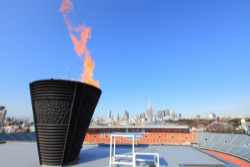 © Kids Web Japan 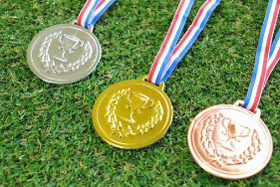 © photoAC 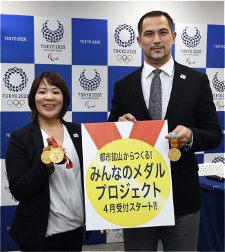 © Kids Web Japan 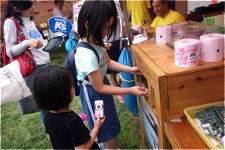 © Tokyo 2020 Medal Project: Towards an Innovative Future for All 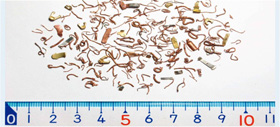 © Tokyo 2020 Medal Project: Towards an Innovative Future for All |
|
Metal recycling is not a new concept in Japan. Japan has a recycling rate of about 98%, supported in part by several laws put forth in 1998, 2012, and 2013 that focused not only recycling but on recovery and reuse of useful metals in discarded home appliances. Rare and precious metals are used in electronic and home appliances as plating on components, wires, and films. Under Japan’s recycling laws, appliances big and small, from air conditioners and laundry machines to small game machines have to be recycled. Makers and certified metal refining facilities then begin a process of “urban mining” to recover gold, silver, copper and other rare materials like platinum and palladium from these discarded appliances. The laws do not cover all recyclable appliances yet, and as such, will require more interest from the public to ramp up metal recycling efforts. It is hoped that these laws will help mitigate the negative environmental impacts caused by landfills and illegal dumping of electronics.
Japan aims to become carbon neutral by 2050, and to reach this goal, the burden falls not only on the consumer but also the makers themselves to develop processes that are more environmentally friendly and reduce carbon emissions. In recent years, Japan’s top producers of steel have been conducting research to develop technology that can rid scrap metal of impurities, thereby making it recyclable and usable in the steel-making process. Metal is a finite resource, but through the combined efforts of makers and consumers, these resources can enjoy a longer lifespan in daily products and leave less of a negative impact on the environment. This July, let’s cheer not only for the athletes participating in the Olympics, but also for everyone trying their best to make the environment better through recycling! |
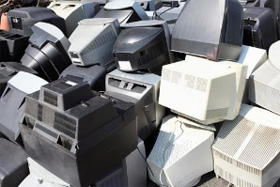 © photoAC 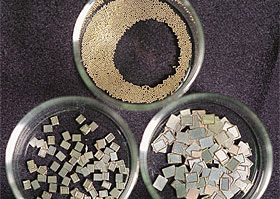 © Sakai Nobuhiko 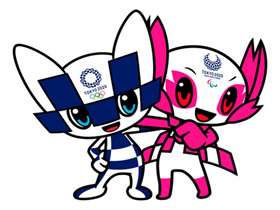 © Tokyo 2020 |
Resources
|
Designs of Tokyo 2020’s recycled medals unveiled. (2019). Retrieved 21 June 2021, from https://olympics.com/en/news/designs-of-tokyo-2020-s-recycled-medals-unveiled |
|
Japan Creative Centre 4 Nassim Road, Singapore 258372 +65 6737 0434 / jcc@sn.mofa.go.jp https://www.sg.emb-japan.go.jp/JCC/ Nearest parking at Orchard Hotel & Delphi Orchard |
 |